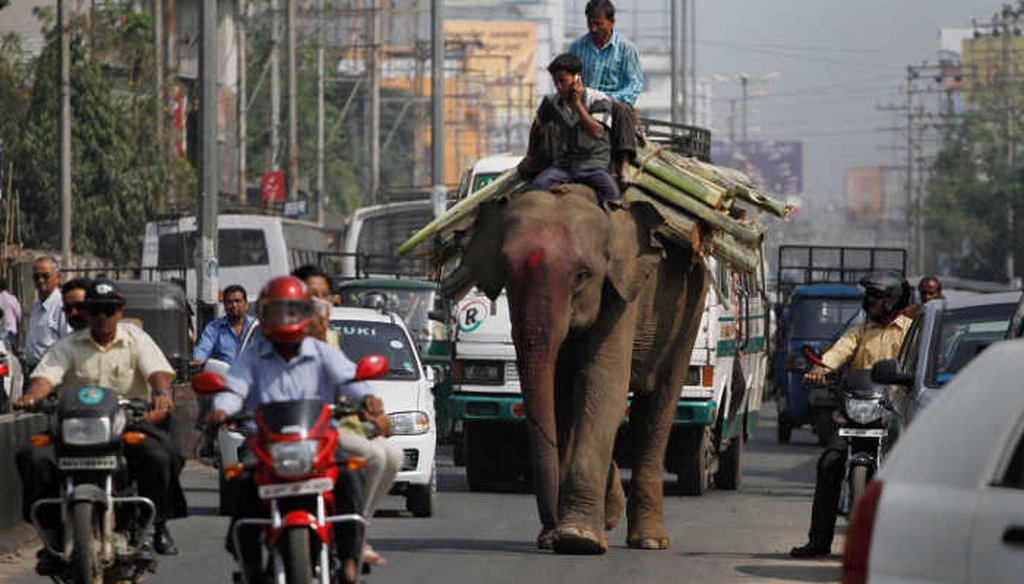

Our only agenda is to publish the truth so you can be an informed participant in democracy.
We need your help.


A mahout talks on a mobile phone as he walks through a busy street in Gauhati, India. Allegations that Snapchat's CEO called India too poor for the photo sharing app caused an uproar. (AP)
Snapchat pictures might come and go in seconds, but the furor in India over reported comments by Snapchat CEO Evan Spiegel is hanging on much longer.
On April 15, News18, a CNN affiliate tweeted, "Snapchat CEO Evan Spiegel has said the app is for rich people, don't want to expand in poor countries like India and Spain."
Outraged Indians launched a campaign to undercut the social media photo and video sharing application.
Gaurav Pradhan, who has over 80,000 followers, retweeted an image that urged Indians to uninstall the application and give it a one-star rating on Google’s Play Store. Pradhan’s wrote, "If Indians, across world and in India have any "Self Respect" left. Uninstall @Snapchat now and give a KICK 2 this arrogant Headless Chicken."
Snapchat is in damage control mode. In a statement, Snapchat denied that Spiegel said the offending words.
"This is ridiculous," the company said, according to reports. "Obviously Snapchat is for everyone! It’s available worldwide to download for free."
We decided to see whether it’s accurate to assert categorically that Spiegel said India was too poor for Snapchat.
In this case, certainty is elusive, because it comes down to one person's word against Snapchat's.
Magazine article triggers firestorm
On April 11, Variety published a story about a former Snapchat manager’s lawsuit against the company.
The headline alone highlights the key caveat: "Snapchat CEO Said ‘This App Is Only for Rich People,’ Ex-Employee Alleges."
A Jan. 4, 2017, filing had this account of an exchange between former manager Anthony Pompliano and Spiegel (pages 19 and 20 in the file).
"The data showed that Snapchat’s international user metrics were very low, even in countries with high social media engagement, such as Spain and India. When Mr. Pompliano attempted to explain that he could implement strategies to achieve significant growth for Snapchat in these major markets, Mr. Spiegel abruptly cut in and said, ‘This app is only for rich people. I don’t want to expand into poor countries like India or Spain.’"
This conversation allegedly happened on Sept. 11, 2015, a year and a half before the filing.
So far, that is the sum total of the evidence that Spiegel disparaged Spain and India. Two other people were in the room, but Spiegel’s alleged response was tangential to the meat of the lawsuit and there is no further testimony on this point. (We have not seen reports about a backlash in Spain.)
We have one man’s word that Spiegel said this, and that man is suing Snapchat.
The larger Indian news organizations noted the uncertainty behind the allegation.
Our ruling
A viral post in India asserted that Snapchat CEO Spiegel said his company’s application was for rich people and not poor places such as India.
The article that fueled this meme stated at the top that Spiegel allegedly said these words, not that he definitely had.
The lawsuit behind the article provides no evidence beyond saying that a former employee said the exchange took place. If there was a conversation, it happened a year and half ago, which raises questions of how accurately the exact words can be relied on.
We might learn more, but until then, we rate this statement Mostly False.
Gaurav Pradhan, tweet, April 16, 2017
News18, tweet, April 15, 2017
Forbes, Snap's Evan Spiegel Is Right Though, Snapchat Is An App For Rich People, Not India, April 17, 2017
Variety, Snapchat CEO Said ‘This App Is Only for Rich People,’ Ex-Employee Alleges, April 11, 2017
Superior Court of the State of California for the County of Los Angeles, Lawsuit filings, April 10, 2017
CNN, Snapchat denies its CEO labeled India as 'poor', April 17, 2017
Hindustan Times, Snapchat denies CEO’s "poor India" comment, but #boycottSnapchat trends online, April 17, 2017
In a world of wild talk and fake news, help us stand up for the facts.
